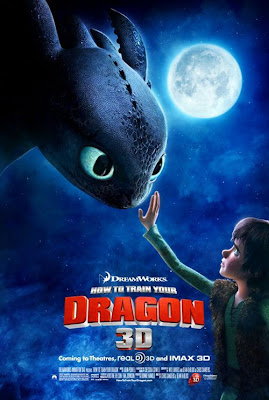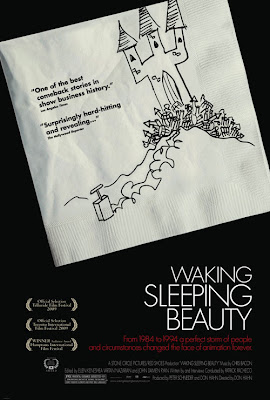 Dragon Tale
Dragon TaleIt is no secret that in today's world of powerhouse animation, the biggest battles right now are being fought between Pixar and Dreamworks. More often than not, Pixar is the studio that comes out on top, as they should. After all, you cannot compare the likes of WALL-E, The Incredibles, Ratatouille and Up to films like Madagascar, Shark Tale, Bee Movie or even Shrek. Two years ago, Dreamworks did have a film that could have matched Pixar, one that avoided the contemporary pop culture references in favor of a good story filled with a rich landscape of character and visual. Kung Fu Panda couldn't upset that tiny, adorable robot that year, but it showed that this studio could deliver a film that was very satisfying. Their latest effort is further proof, one that isn't quite as good as the panda, but is very enjoyable and a feast for both the eyes and the heart.
The setting is a well-off Viking village in the distant past that is being terrorized by ferocious dragons. Viking leader Stoick (Gerard Butler) is the great commander who's a tough as nails but must deal with his meeker son, given the unfortunate name Hiccup (Jay Baruchel). Hiccup dreams to be a strong Viking like his father, so much so that he manages to take down the most elusive and powerful of the bunch known as Night Fury. But Hiccup can't bring himself to kill the creature, which he later befriends and affectionately calls "Toothless" because of its retractable dentures. Their relationship leads to Hiccup figuring out that the dragons aren't so ferocious as they seem, and his main struggle is to make the other members of the village, his father in particular, realize this as well.
Given the latest 3D boom, it's becoming more difficult to determine which films are necessary to see in that extra dimension, meaning which ones are absolutely worth the extra price. Alice in Wonderland wasn't; this one most certainly is. The greatest effect is the flying scenes, which will give obvious callbacks to Avatar. The visual intensity of those scenes are magnified by the creative use of 3D, and, much in another similar method to Cameron's film, is used as a tool to help immerse the audience in this world. The other methods of creating a real space of depth is also extraordinary, and this is one film that does benefit from that extra cost. I admire directors Chris Sanders and Dean DeBlois for their creative use of the camera and visual landscape.
The voice talent, I will admit, could have been a little more forceful in the film, but they don't damage it completely. Baruchel's trademark shyness lends itself quite well to his character and Butler's booming oration goes hand in hand with his also. But secondary players ranging from America Ferrera to Jonah Hill to Christopher Mintz-Plasse to others feel as though they're a bit wasted in secondary characters with very little depth. The true magic in this movie is between Hiccup and Toothless, which seem to have taken notes from WALL-E and Up as to what can be accomplished through very little dialogue. The emotional moments between the two are warmly felt and come across very strong. It's the strongest portion of the film, and fortunately it is used to great effect.
The movie isn't perfect as there are some slow spots in the film, some lack in many of the secondary characters, not all the jokes land as squarely as others and the fortune cookie message may seem a bit simplistic at times. But so what; Kung Fu Panda had similar issues, and I still walked away loving that film. Like that one, this is another film that divorces itself from the usual Dreamworks tricks and instead focuses on story and characters. Added to it the tremendous visual landscape enhanced by the 3D and the amazing score by John Powell, and you've got a tremendously satisfying film. I certainly want to see this movie again, and trying for the gigantic IMAX format. Well done Dreamworks. Pixar, your move. ***1/2 / ****; GRADE: B+
It's an interesting notice when you get a film, or documentary to be specific in this case, that offers an in-depth look at a subject that has been present throughout your entire life but never quite understood to its fullest extent. I bet there are few people out there who are not aware of the impressive impact that classic animated Disney films had on their childhoods; it's inescapable. Those childhoods are usually divided into three sections now: the classic films of the 30s thru 50s, the rebirth from the late 80s to early 90s, and finally to the new decade where attention focused to the 3D animation branch known as Pixar. My early childhood was introduced heavily to the second era of Disney classics, and this film is a fascinating look at the tortured history leading up to those memorable films as well as the difficulty at even getting them made.
Made by two former Disney insiders, the film weaves the tale of how the animation department at Disney was nearly dismantled after a string of flops, most infamously The Black Cauldron, which went way over-budget and did terrible at the box office (it was beat out by the Care Bears movie). With that, the company brought in new management, with the three big players being Michael Eisner, Jeffrey Katzenberg and Roy Disney battling each other to keep the company afloat. Disney made strides starting with The Little Mermaid (though, apparently, Oliver and Company did quite well), particularly when they brought in the song-writing team of Howard Ashman and Alan Menken. This was a success that lasted all the way till The Lion King when Katzenberg resigned due to tensions between Eisner and Disney.
Despite being produced by people who had inside knowledge of these events, this isn't a glossed over version of the events, nor does it make it seem like the successes and failures of this company belong to one person. There's a fairly even handed attempt to keep the perspective as clean as possible, and to get such an objective look into a disguised messy situation is quite astounding. Director Don Hahn, the producer of films like Beauty and the Beast and The Lion King, never goes for the jugular, or even the arrangement of the talking heads spewing into the camera. The interviews are heard off screen to some archival footage, giving them a lot more meaning and emotional depth.
Adding to all this, if you are simply a fan of Disney filmmaking history in general, then there's plenty of tidbits the movie shows that can put a smile on your face. For instance, there's something magical about seeing a young Tim Burton, who worked as an animator on Cauldron and Fox and the Hound, shooting a distraught stare into the camera while an upbeat voice calls his name offscreen. The greatest treasure I think the film offers is, at last, a decent look at what Howard Ashman created for Disney, and how his relation to the films as musical theatre (Ashman and Menken created the Little Shop of Horrors Broadway show) really brought Disney out of its hole. Unfortunately, Ashman died of AIDS in 1991, eight months before Beauty and the Beast was released, and the film's loving tribute to his work is very much appreciated from at least one person out there.
If there's one complaint I have against the film, it is that it ends too early. That's not to say the film is short, but its story stops right after Katzenberg left and they were still flying high with The Lion King. It would have been interesting to see what the effect of Katzenberg leaving truly had on the company, and how films like Pocahontas and The Hunchback of Notre Dame changed production and Disney itself. But even though the film has an intentionally glossy ending, this is still a fascinating look at a company that many know through their work but remain elusive in other ways. It's funny, endearing and, most of all, will make you want to go back and watch all those old Disney films again. The romanticism of Beauty and the Beast, the first animated film ever to be nominated for the Best Picture Oscar, made me want to return to that film more than any other. That is what I call Disney magic. ***1/2 / ****; GRADE: A-

No comments:
Post a Comment